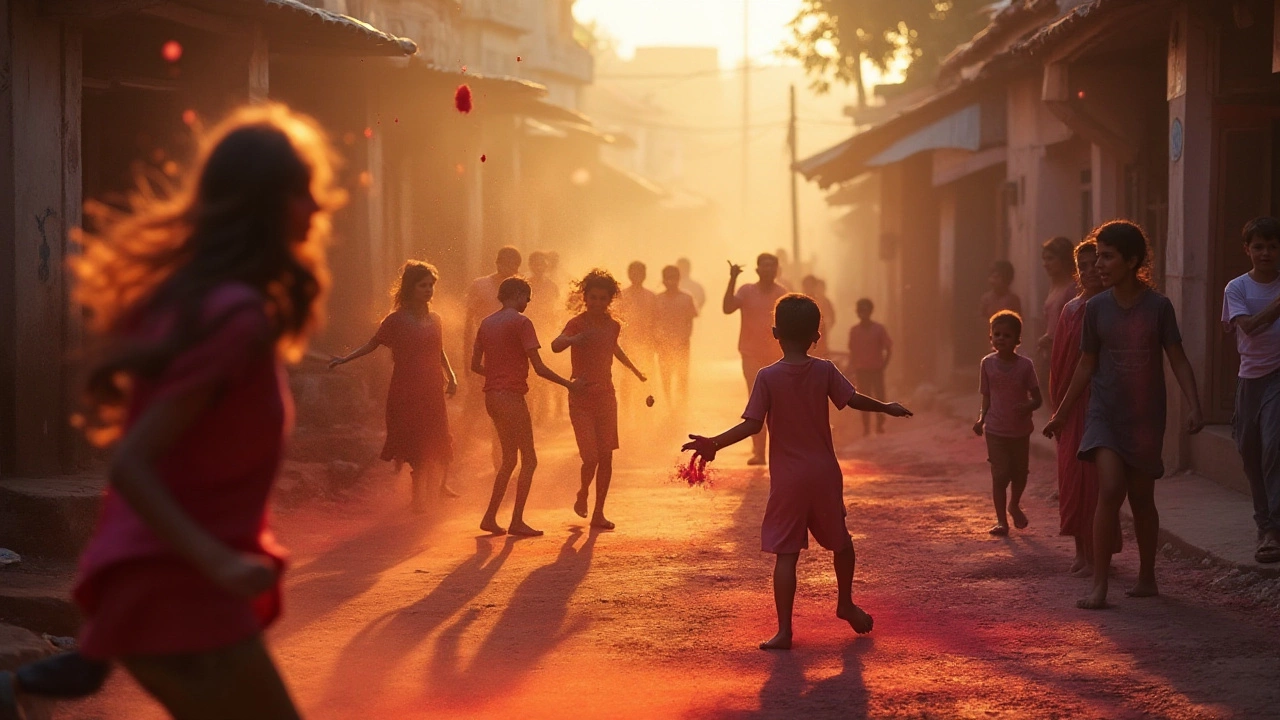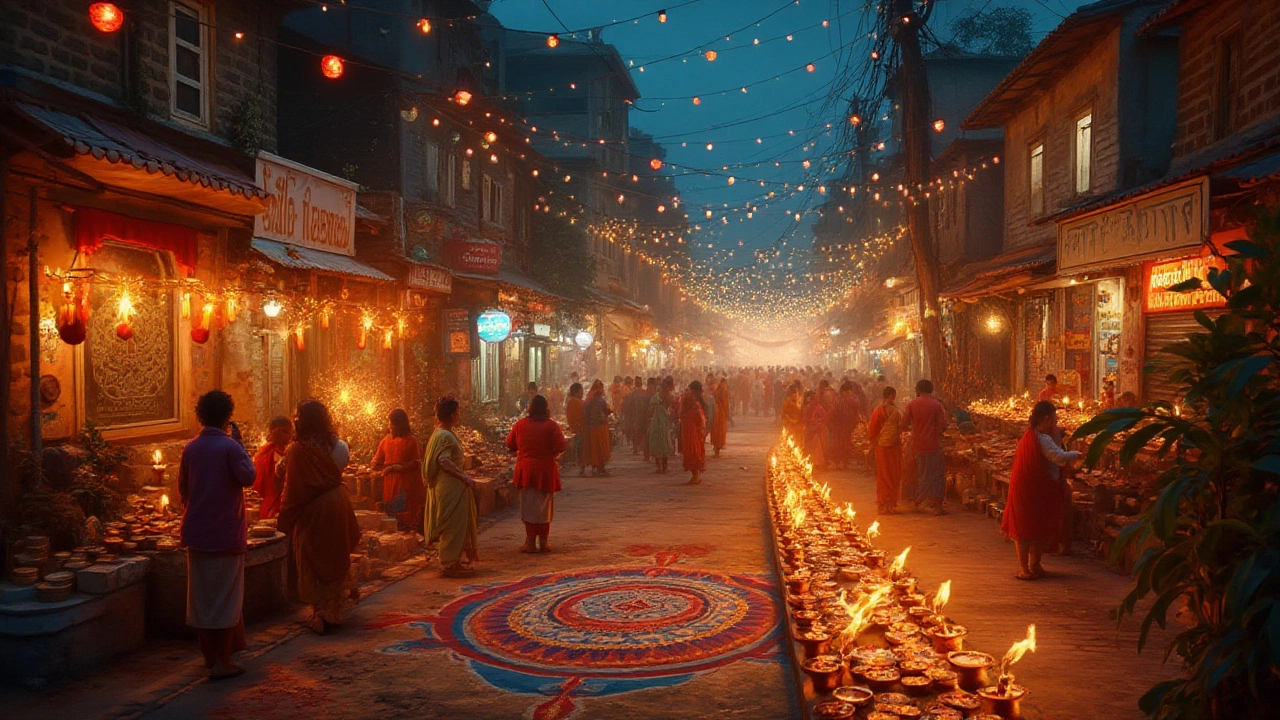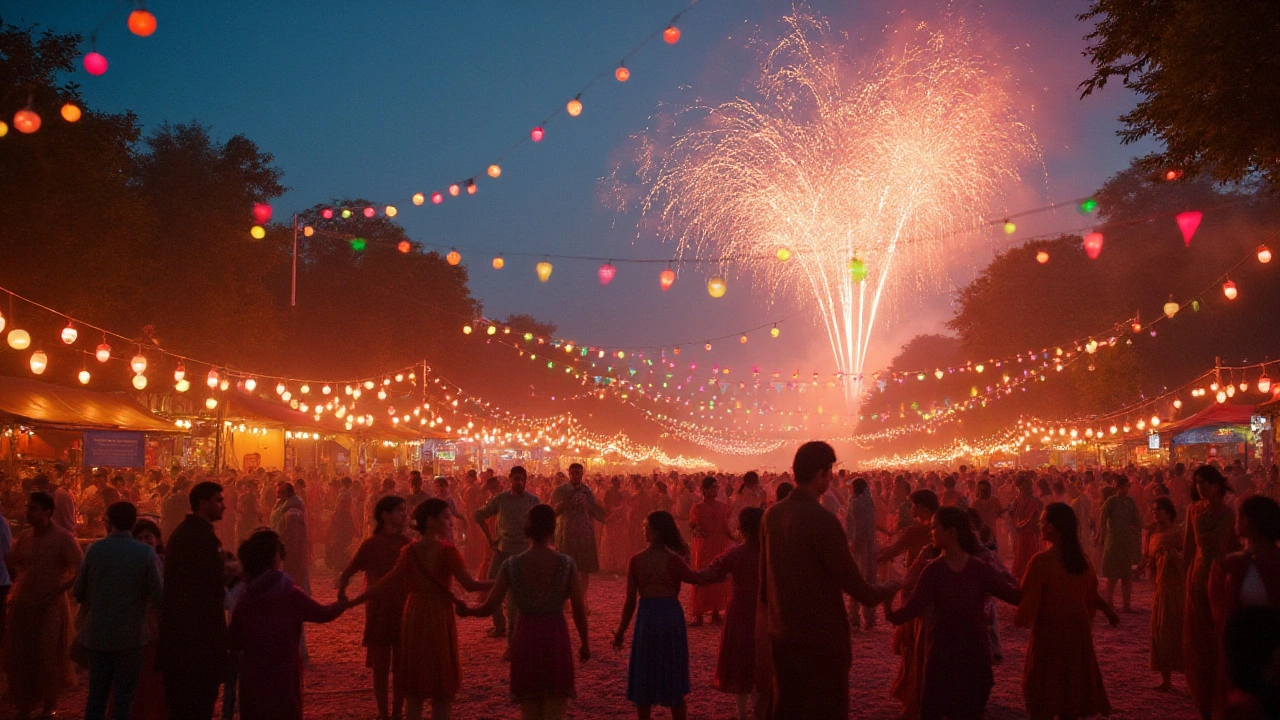India is a land where festivals are more than just a time of celebration; they are the heartbeat of its soul. From the colorful explosion of Holi to the heartfelt gratitude of Pongal, each festival tells a story and unites communities. Yet, there's one festival that captures the imagination and spirit of the majority - Diwali.
Known as the Festival of Lights, Diwali is an enchanting spectacle of twinkling lamps and joyous gatherings. It's celebrated with fervor across the length and breadth of the country, transcending regional boundaries. But what makes Diwali so special, and why does it hold a crown of cultural significance? The answer lies in its rich traditions, universal themes of triumph over adversity, and its ability to bring people together.
This article will guide you through the world of Indian festivals, highlighting why Diwali often takes center stage in the grand theatre of celebrations. We'll explore, reflect, and embrace the diversity and splendor that these events bring into our lives.
- An Abundance of Celebrations
- The Allure of Diwali
- Regional Perspectives
- Cultural Significance
- Why Festivals Matter
An Abundance of Celebrations
India is a tapestry of traditions and customs, woven together through its multitude of spirited festivals. Each festival represents more than just a moment to rejoice; it is a narrative steeped in myth, history, and the essence of life's diverse phases. With over a billion people and a dizzying array of religions and regions, the sheer number and variety of Indian festivals is astounding. There are festivals for every season, purpose, and mood in this land of contrasts. Festivals like Navratri, Durga Puja, and Dussehra mark the triumph of good over evil, symbolizing both mythological and spiritual victory for millions. Over the course of nine nights and ten days, the heartbeats of folk music, dances, and religious rituals energize communities.
The cultural landscape shifts with each festival, spotlighting unique regional hues. For instance, in the lush fields of Punjab, the springtime energy of Baisakhi celebrates the harvest and is a testament to agrarian prosperity. In contrast, the rhythmic thunder of drums during Onam in Kerala invites legends of King Mahabali back to every homestead, highlighting the shared spirit of unity and festivity. Each celebration, regardless of its origin, draws people together, reinforcing a shared sense of identity and community. Here's an interesting anecdote: the Indian festival calendar lists over a thousand distinct celebrations each year!
One cannot overlook the personal stories woven into each celebration, adding layers of meaning. A Diwali night in Jaipur isn't the same as in Mumbai. A friend from Bengal fondly recalls his vivid childhood memories of crafting lanterns with his family for Kali Puja, pointing out that such crafts are not only about decoration but also a gesture of love and care. As Sebastian Coe once encapsulated, "Miracles sometimes occur but one has to work terribly hard for them"; these festivals, while seeming miraculous in their beauty and harmony, involve immense community effort.
Some festivals, such as Diwali and Holi, are celebrated nationwide, transcending linguistic and cultural barriers. The Festival of Lights, Diwali, is particularly celebrated for promoting inclusion, as it brings people of all faiths together in shared happiness. The bursts of color in Holi are reflected in the playful interactions and renewed friendships. Yet, not every festival receives such universal acclaim. Some are geographically limited yet culturally profound—like the Buddhist Losar in the dazzling valleys of Ladakh, marking the Tibetan New Year with masked dances and rituals. Debates about which festival holds the crown may continue forever among citizens, as each festivity holds personal stories and cherished memories. However, what stands above all is the collective joy and shared humanity these events foster.
The Allure of Diwali
Diwali, often referred to as the Festival of Lights, is much more than just an occasion of joyous festivities; it's a profound symbol of the victory of light over darkness, and good over evil. Celebrated with unbridled enthusiasm by Hindus, Sikhs, Jains, and some Buddhists across India and the world, Diwali fills the atmosphere with an infectious sense of excitement and warmth. The festival spans five days, each with its own unique significance and customs, creating a tapestry of rituals that are deeply rooted in mythology and tradition. During Diwali, millions of homes are adorned with brilliant diyas and vibrant rangolis, while the sounds of joyous laughter and exuberant firecrackers echo in the air, transforming the festive period into a mesmerizing spectacle.
"Diwali—the festival of lights—is a celebration of India's rich heritage, unity, and spirituality. It shines brightest when we come together in the spirit of compassion and hope." – Ministry of Culture, Government of India
The first day, known as Dhanteras, marks the beginning of the festivities with a focus on wealth and prosperity. People indulge in shopping for precious metals, consider it an auspicious time to bring new items into their homes, and worship Lord Dhanvantari and Goddess Lakshmi. The charm of Diwali lies not just in its dazzling displays, but also in its underlying messages and stories. On the third day, which is the main event, families perform the Lakshmi Puja, invoking the blessings of the Goddess of Wealth. Evening lights fill with an almost ethereal glow, symbolizing the triumph of inner light.
Moreover, Diwali's popularity has seeped into diverse cultures, each adding its unique flavors to the traditional observances. The multicultural engagement with the festival means different regions highlight certain legends such as the return of Lord Rama to Ayodhya or the Narkasura Vadha celebrated in South India. The North remembers the homecoming of King Rama by lighting lamps, while the East joyously celebrates Kali Puja, and in some parts of the South, the victory of Lord Krishna over the demon Narakasura is commemorated. This regional adaptation is part of what keeps Diwali consistently fresh and locally relevant, making it a celebrated Indian festival around the globe. In a broader sense, Diwali's appeal lies in its ability to forge connections—between families, friends, and even businesses. Gift-giving marks a significant practice where boxes of sweets and small tokens are exchanged, serving as reminders of gratitude and goodwill. Consequently, the economic impact of the festival is profound, boosting markets and invigorating trade across various sectors.
For those who observe a modern twist on traditional practices, there are eco-friendly celebrations that focus on sustainability. From opting for biodegradable decorations to reducing noise pollution by limiting fireworks, Diwali continues to evolve while staying true to its essence. Tables groan under the weight of delectable feasts, featuring traditional sweets like gulab jamun, laddus, and kheer, alongside savory treats. Yet amidst all this celebration, let us not forget the importance of light—a reminder of hope, resilience, and a beacon for new beginnings. The charm of Diwali endures not simply because of its ancient roots, but because of the way it brings communities together in joyous celebration, bridging past and present in the captivating traditions of the festival.

Regional Perspectives
India is a country that thrives on diversity, a place where every region holds on to its unique customs and traditions. While Diwali is celebrated nationwide, the way it is observed can vary significantly from one region to another. In North India, Diwali symbolizes the return of Lord Rama to Ayodhya after defeating Ravana, and the celebrations are steeped in this epic narrative. Families gather under the night sky lit with a myriad of fireworks, while homes are adorned with diyas (clay lamps), turning the entire landscape into a shimmering spectacle.
In Western India, particularly in states like Maharashtra and Gujarat, Diwali involves the worship of Goddess Lakshmi, the deity of wealth, and it's seen as an auspicious time to invest in new ventures. The vibrant colors of rangoli—intricate designs made on the floor with colored powders—add to the festive atmosphere. Meanwhile, in the Eastern part of the country, especially in Bengal, Diwali coincides with Kali Puja, where Goddess Kali is revered with fervent devotion, and the night is filled with rituals and offerings.
The Southern regions of India tell another side of the Diwali story. In Tamil Nadu and Karnataka, it is celebrated as the day Lord Krishna vanquished the demon Narakasura. Morning rituals start with an oil bath meant to purify and rejuvenate the spirit, followed by a day full of cultural activities, festive meals, and sweet exchanges. As we move towards smaller communities, tribal groups often have their own unique interpretation of Diwali, blending traditional practices with their cultural beliefs.
The diversity of Diwali celebrations across India is like a beautiful tapestry, each thread contributing to the whole, as noted by the renowned historian Romila Thapar, "In its varying forms, Diwali epitomizes the cultural composition of India, a country where the mosaic of beliefs binds different regions together in unified joy."
The compelling regional variations of Diwali underscore the vast cultural tapestry that is India. Within this broader framework, each celebration is a testament to the subcultures and their histories, proving that even within commonalities, there are diverse interpretations. In each region, Diwali functions as a cultural prism, reflecting an array of practices that resonate with a shared yet distinct heritage. This layered celebration reminds individuals of their roots, imparting lessons of unity, understanding, and mutual appreciation that transcend regional boundaries, making Diwali truly a festival for everyone.
Cultural Significance
The cultural significance of Indian festivals, notably Diwali, is intricately woven into the fabric of the country’s collective ethos. Diwali stands out not only for its grandeur but also for its universal message of light prevailing over darkness, and good triumphing over evil. This festival resonates deeply with people of various backgrounds, epitomizing values that are cherished and celebrated worldwide.
The legend of Diwali traces back to ancient times and finds its roots in multiple mythologies. The most famous of these is the return of Lord Rama to Ayodhya after a 14-year exile and his victory over the demon king Ravana, an event that symbolizes the ultimate triumph over evil. As the story goes, the people of Ayodhya lit lamps to light the path of their returning king, which is echoed today in the twinkling lights that adorn homes during the celebration.
Diwali's cultural richness doesn't end there. It's a festival that promotes unity and understanding. Participating in rituals, exchanging gifts, and enjoying sweet treats are tangible ways people reaffirm social bonds, express gratitude, and seek blessings for prosperity. As noted by cultural historian, Dr. Vinod Prabhas, "Diwali is not just a festival, it’s an experience that connects the old with the new, tradition with modernity."
During Diwali, the timeless traditions celebrated are a reminder of our past, and a beacon that guides us towards a brighter future.
In India, diversity is celebrated in places like Gujarat and West Bengal, where people engage in regional variations of Diwali festivities. In Gujarat, the festival coincides with the Gujarati New Year, making it an even more profound period of reflection and celebration. Meanwhile, in West Bengal, the festival known as Kali Puja sees devotees honor Goddess Kali instead of Lakshmi, showcasing India's ability to harmoniously blend local customs with national traditions.
The traditions of Diwali help strengthen the bonds between people. Shared meals, vibrant rituals, and swapping heartfelt wishes create moments that are cherished long after the lamps are extinguished. This festival also has an economic impact, as markets are flooded with traditional attire, sweets, and gifts, driving commercial activity across the country. In recent years, Diwali's appeal has extended beyond India, with global celebrations illustrating the power of cultural exchange. Mitsuko Sato, an anthropologist studying international festivals, mentions, "Diwali's spread across continents enriches the cultural tapestry of each locale, fostering an appreciation of Indian heritage."
Through Diwali, we experience a shared joy that knows no boundaries, uniting people in a celebration of life and enlightenment.

Why Festivals Matter
Festivals hold a pivotal place in the cultural and social fabric of India. They are not just occasions of joy and merriment, but they also serve as powerful reminders of shared history, beliefs, and traditions. In a country as diverse as India, with its multitude of religions and languages, these Indian festivals offer a much-needed sense of cohesion and belonging among its citizens. Festivals transcend individual differences, uniting people from various backgrounds to celebrate common values and traditions.
One of the significant reasons why festivals are important lies in their ability to educate the masses. Each festival has its unique story, derived from mythological epics, historical events, or seasonal changes. For instance, Diwali, the Festival of Lights, symbolizes the victory of light over darkness and knowledge over ignorance, derived from the ancient tales of Lord Rama's return to Ayodhya. Through storytelling and ritual practices, generations learn about these historic events, ensuring that the legacy of cultural heritage is passed down. As Rabindranath Tagore once said,
"The festival of the light is the harbinger of joy, prosperity, and eternal wisdom—symbolic of the triumph over ignorance."
Moreover, these celebrations foster communal harmony and social bonding. During Diwali celebrations, families and friends gather, sharing sweets and memories. Doorsteps are lit with oil lamps, and community gatherings lead to meaningful interactions. Such moments of togetherness allow people to strengthen familial ties and build relationships with their neighbors, reinforcing the social structure and collective identity. Notably, statistics show that during festivals, there is a significant uptick in social interactions and communal activities across urban and rural areas.
Festivals also have substantial economic impacts. They act as catalysts for trade and commerce. Diwali, for example, is akin to Christmas in Western countries when it comes to shopping and gifting. During this time, there is a noticeable spike in sales in sectors like textiles, electronics, and confectionery. Small businesses, artisans, and craftsmen find an enormous demand for their products, boosting local economies. Such festivals contribute to a vibrant economy that benefits from the cultural exuberance.
Finally, the personal impact of festivals cannot be understated. They provide individuals with a break from routine, offering rest and recreation. People reflect, rejuvenate, and partake in introspection during these times. There’s a palpable sense of excitement as one prepares for these festivities—from cleaning homes to adorning them with decorations. These activities bring a sense of anticipation and joy that nourishes the spirit. And, in a world that often races past us, such moments of pause and celebration become ever more valuable.
